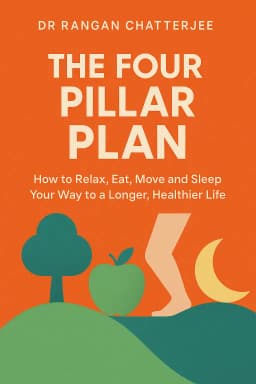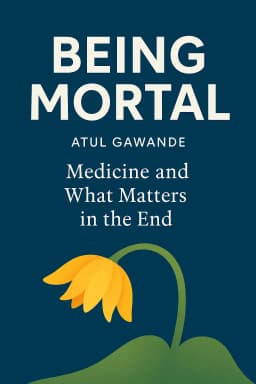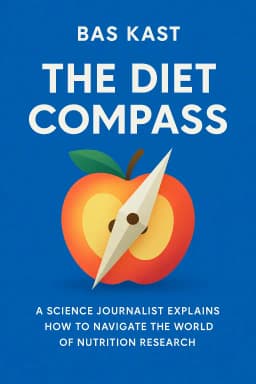
The Centenarian Decathlon: Engineering Your Biology for a Longer, Better Life
Golden Hook & Introduction
SECTION
Nova: Imagine you're standing in a city, and eggs are falling from a tall building. You have a basket, and you get really, really good at catching them. But no matter how skilled you become, some always splatter on the ground. This is how we practice medicine today—we're experts at 'catching the eggs' of disease after they've started to fall. But what if we could climb the building and stop the person throwing them in the first place?
Rebsy Z: That's a powerful image. It immediately makes you question the entire game, not just how well you're playing it.
Nova: Exactly! And that's the revolutionary idea at the heart of Peter Attia's 'Outlive,' and it's what we're exploring today with our guest, Rebsy Z, a wonderfully curious and analytical thinker. Welcome, Rebsy!
Rebsy Z: Thanks for having me, Nova. I'm excited to get into this. That opening idea already has my mind racing about how we approach problem-solving in general.
Nova: I knew it would! So, today we'll dive deep into this from two perspectives. First, we'll explore this game-changing mindset shift from reactive to proactive medicine. Then, we'll unpack the four key 'levers' you can pull—from the food you eat to your emotional health—to start building your own longevity strategy, right now.
Deep Dive into Core Topic 1: Rethinking the Game
SECTION
Nova: Rebsy, that 'falling eggs' dream from the author, who was a surgical resident at the time, just hits so hard, doesn't it? It perfectly captures this feeling of being stuck in a reactive loop.
Rebsy Z: It really does. It's a feeling of heroic effort that ultimately feels... futile. You're winning battles, but you're not changing the course of the war.
Nova: That is the perfect way to put it. And he gives this incredibly vivid, real-world example of that futility from his training. He was at Johns Hopkins, one of the best hospitals in the world, specializing in pancreatic cancer. Now, one of the main treatments for this is a massive, complex surgery called the Whipple Procedure. It's technically brilliant.
Rebsy Z: I can only imagine. The level of skill required must be immense.
Nova: Off the charts. And Attia says they had gotten really good at it. He says, "We had gotten pretty good at catching the eggs." They were saving people on the operating table. But here's the heartbreaking part. He realized that despite their surgical success, the reality was that nearly all of these patients would still die from their cancer within a few years. The egg, as he puts it, would inevitably hit the ground.
Rebsy Z: Wow. So they were perfecting a technique that only offered a very short-term victory.
Nova: Precisely. And it led him to this crisis of purpose, asking, "What are we really accomplishing?" He wasn't just patching people up anymore; he was questioning the entire goal. He realized the real victory wasn't in becoming a better egg-catcher, but in figuring out how to get to the top of that building, find the person throwing the eggs, and stop them.
Rebsy Z: That's fascinating because it's not a failure of skill, but a failure of the. The system, the whole field, was designed to reward catching eggs, not to question why they're falling. It makes you think about other areas, like in technology or social policy, where we get so focused on optimizing a solution that we forget to ask if we're solving the right problem in the first place.
Nova: Yes! You're a perfect example of a Medicine 3.0 thinker, Rebsy. You're already looking at the system. And that's the core of the book: a shift from Medicine 2.0, which is what we have now, to Medicine 3.0, a proactive, preventative approach. It's about stopping the disease before it even starts.
Rebsy Z: Which feels so much more empowering. It shifts the agency back to the individual, to a degree. It’s not just about waiting for a diagnosis; it’s about actively building a defense system throughout your life. It's a mindset of continuous improvement and self-care.
Nova: Exactly! It's about changing the objective from just extending lifespan to dramatically improving our —the quality of our years. And that's where the book gets really empowering. Once you decide to 'climb the building,' you need a toolkit.
Deep Dive into Core Topic 2: The Longevity Toolkit
SECTION
Nova: Attia breaks this toolkit down into four key levers, and this is where it connects directly to your interest in biology and organelles, Rebsy. The four domains are Exercise, Sleep, Emotional Health, and the one I want to zoom in on, Nutrition.
Rebsy Z: I'm ready. I'm always curious about how what we do on the outside affects our inner workings on a microscopic level.
Nova: Well, you're going to love this. The book reframes nutrition not as 'dieting,' but as 'nutritional biochemistry.' It's about understanding that every bite of food is a piece of information you're sending to your cells. One of the most powerful concepts he discusses is how restricting calories, or even just the timing of our food, 'talks' to a specific pathway in our cells called mTOR.
Rebsy Z: mTOR... I've heard of it, but what exactly is its function?
Nova: Think of mTOR as the general contractor for your cells. When there are lots of nutrients and energy around—when you're eating a lot—mTOR is switched ON. It tells the cell, "Times are good! Let's grow, let's divide, let's build!" It's in growth mode. But when nutrients are scarce, mTOR quiets down. It switches OFF. And this is where the magic happens. The cell flips from 'growth mode' into 'clean-up and repair mode.' This process is called autophagy, where the cell literally starts recycling old, damaged parts.
Rebsy Z: So, it's like our cells have a built-in 'low-power mode' that's actually beneficial for longevity? That's incredible biological engineering. It reframes 'hunger' not just as a feeling, but as a signal that initiates a vital maintenance protocol.
Nova: That's it! It's a maintenance protocol! And this isn't just theory. This whole field was blown open by the discovery of a compound called Rapamycin. In the 1960s, scientists collected soil from Easter Island—Rapa Nui—and a biochemist named Suren Sehgal found a substance in it that powerfully inhibited mTOR. He smuggled it home in his freezer when his lab was shutting down. Years later, research showed that this compound, Rapamycin, dramatically extended the lifespan of mice, even when given to them late in life. It was the first molecule ever shown to do so in mammals.
Rebsy Z: That is an amazing story. So this isn't just a lifestyle concept; there's a direct chemical pathway that can be targeted. It makes the idea of things like intermittent fasting feel less like a fad and more like a way to consciously hack into this ancient, pre-programmed system. It's a habit with a direct microscopic payoff.
Nova: A direct microscopic payoff! I love that. And that's the key. The other levers work in similar ways. Exercise, for example, is described as the single most powerful longevity 'drug' we have, influencing everything from our mitochondria—the power plants of our cells—to our brain health. Good sleep is when the brain's 'janitorial staff' comes in and clears out metabolic waste that can lead to neurodegeneration. And, crucially, emotional health is the foundation for it all. Attia is very open about his own struggles, making the point that a long life is meaningless if you're miserable.
Rebsy Z: That really resonates with my interest in empathy and emotions. It's a holistic view. You can't just optimize the physical machine without tending to the person operating it. It all has to work in concert. It's a complete system.
Synthesis & Takeaways
SECTION
Nova: It is a complete system. So, as we wrap up, we've seen this profound need to shift our mindset from being reactive patients to proactive agents of our own health.
Rebsy Z: And we've seen that we have this incredible toolkit—these levers of nutrition, exercise, sleep, and emotional health—that allow us to send positive signals directly to our cellular machinery. It's about moving from being a passenger to being the pilot of our own health.
Nova: Beautifully said. So, Rebsy, to make this real for everyone listening, Attia suggests we define our own 'Centenarian Decathlon.' It's a list of ten or so physical tasks you want to be able to do effortlessly in your ninth or tenth decade of life. What's one physical thing you'd want to be able to do at age 90?
Rebsy Z: Hmm, that's a great question. I think for me, it would be the ability to get down on the floor to play with a great-grandchild, and then get back up easily, without a second thought. It seems simple, but it represents so much—strength, stability, and connection.
Nova: That's a perfect one. It's so tangible. And it requires training for strength, balance, and mobility, starting now. So, for everyone listening, our final question is this: What's on your list? What's the first event in your Centenarian Decathlon? Because thinking about that is the very first step in building your own strategy to outlive.
Rebsy Z: A powerful way to start. Thanks, Nova. This was fantastic.
Nova: Thank you, Rebsy. It was a pleasure.









